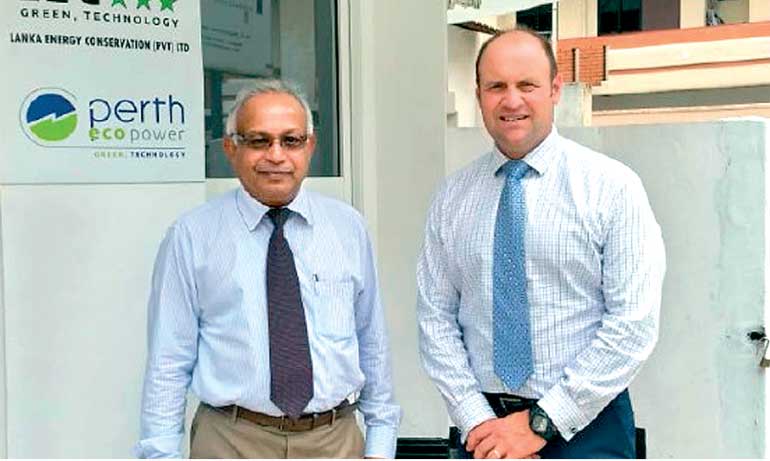Friday Feb 20, 2026
Friday Feb 20, 2026
Tuesday, 4 October 2016 00:01 - - {{hitsCtrl.values.hits}}
Leading wave energy developer, Carnegie Wave Energy Ltd., is expanding its commercial wave and microgrid projects into Sri Lanka through the signing of a Memorandum of Understanding (MOU) in Colombo today, with the Lanka Energy Conservation Ltd.
The agreement focuses on identifying the opportunities and development pathways for commercial wave energy plants on Sri Lanka, as well as potential microgrid opportunities that would enable CETO wave farms to be integrated into the existing or new power infrastructure to supply clean power and freshwater.
The MOU was announced last week by Carnegie’s Greg Allen, and by Lanka Energy Conservation’s Ltd, Dammica Wickramaratne in Colombo, Sri Lanka.
Carnegie’s Chief Operating Officer Greg Allen said: “Carnegie has made significant progress in our entry into the small island markets this year. The signing of this MOU provides us with another opportunity to provide services to explore the possibility of incorporating CETO, along with microgrid solutions, to enable high penetration of renewable energy, displacing imported diesel.
Lanka Energy Conservation Ltd Chairman and Managing Director Dammica Wickramaratne commented: “Sri Lanka shows good potential for wave, solar and wind energy power. Our population of 23 million is currently powered predominately by a mix of coal, diesel and hydropower with less than only 5% being powered by wind and solar. Sri Lanka is also a signatory to the Paris Agreement for Sustainable Energy development.”
 Lanka Energy Conservation Ltd Chairman and Managing Director Dammica Wickramaratne (left) and Carnegie’s Chief Operating Officer Greg Allen in Colombo
Lanka Energy Conservation Ltd Chairman and Managing Director Dammica Wickramaratne (left) and Carnegie’s Chief Operating Officer Greg Allen in Colombo
Allen also noted that: “Island nations are assessing clean, cost effective, alternative energy solutions to remove their reliance on electricity generated using imported fossil fuels. These imported fossil fuels come at a high cost, do not provide energy security and have a significant environmental footprint. Carnegie presents an effective clean energy alternative that can provide a solution for island and fringe of grid communities globally.”
This announcement follows a similar pathway adopted by the Government of Mauritius, resulting in the recent successful deployment of a wave monitoring buoy off the coast of Mauritius by Carnegie, as part of a series of work packages that will identify the opportunities and a design for CETO and microgrid solutions on the islands of Mauritius and Rodrigues, currently being delivered by Carnegie.
It also follows the Australia Government’s ARENA (Australian Renewable Energy Agency) commitment of $2.5m in funding to Carnegie’s world-first Garden Island Microgrid Project announced earlier last week.
Carnegie Wave Energy Limited is an Australian, ASX-listed wave energy technology developer. Carnegie is the 100% owner and developer of the CETO Wave Energy Technology intellectual property. Carnegie is focused on commercial opportunities in key target markets including UK, Europe and remote islands. Carnegie also owns 35% of leading Australian battery/solar micro-grid EPC, Energy Made Clean, with whom Carnegie has a Strategic Alliance agreement focused on delivering mixed renewable micro-grid projects to islands and remote and fringe of grid communities.
A microgrid is a discrete energy system made up of distributed energy sources that are capable of operating independently from the main power grid. Renewable microgrids that combine multiple renewable energy generation sources (e.g. solar, wind and wave) take advantage of different renewable energy profiles at different times of day, and with different seasonal variation, to reduce the amount of energy storage and diesel generation required. Renewable micro-grids can be used to cut costs, cut greenhouse gas emissions, and in the case of high penetration renewable micro-grids, allow communities to be more energy independent and more environmentally sustainable. The precise mix of renewable sources, energy storage, fossil fuel and desalination will depend on the mix of renewable resources available locally and the needs of the customer.
Lanka Energy Conservation (LEC) of Sri Lanka is an associate company of Perth Eco Power and is the selected system integrator for Sri Lanka & Maldives by world leading Energy Engineering companies like SMARDT-POWERPAX – Australia and SCHNEIDER ELECTRIC –France.
LEC offers its expertise in energy conservation, energy management, waste heat into free power and technology services. Understanding the pressures to do more with less in the energy industry, LEC guarantees cost efficient solutions and innovative technology. Its technology lends itself to intelligent operational efficiency.